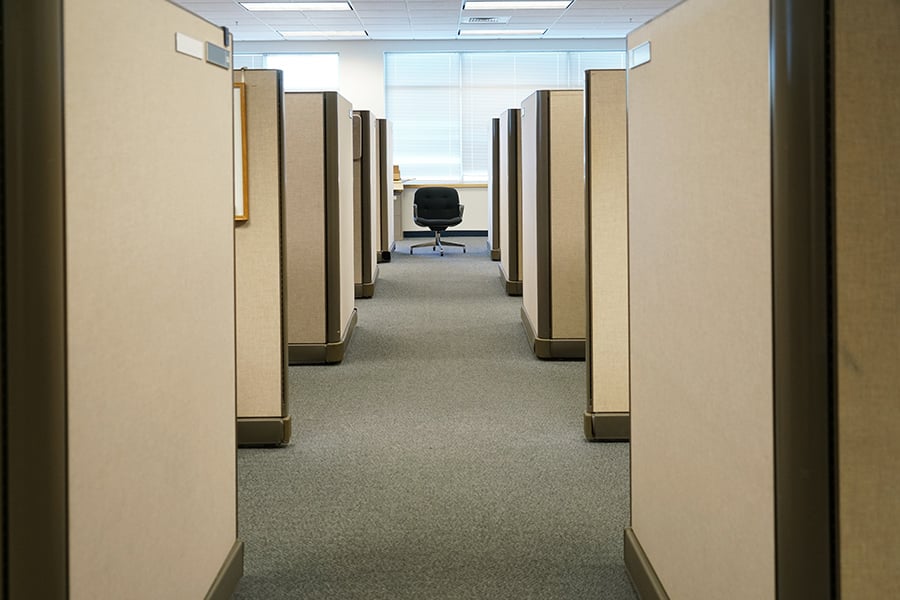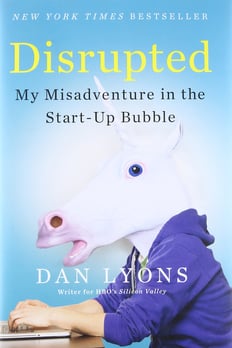📖Applauz Book Club is a series that outlines noteworthy ideas from popular books on the topics of work, HR strategy, and management. To see last month’s Applauz Book Club article, click here.
Have you ever worked for a company that made you dread going to work?
The answer, I'm guessing, is a resounding — yes.
If you're lucky enough to say "no," I bet you can think of a friend who's always complaining about their job, boss, or general work environment.
In other words, you don't have to look far to find someone who's deeply unhappy at work.
A tough question to answer
By looking through a cultural and economic lens, author Dan Lyons tries to answer the question, "why are so many modern workers unhappy."
His investigation of modern work practices started in 2013 when the journalism industry went through a massive shift, and he was laid off from his role as tech editor at Newsweek. Like many other reporters and journalists, Lyons pivoted his career and went to work in marketing for Massachusetts-based startup — HubSpot.
Disrupted: My Misadventure in the Start-Up Bubble (2016) is a first-hand look at the experience of working for a fast-growing tech company on the verge of an IPO. But more importantly, what goes on behind the shiny façade of craft beer and ping pong tables. Spoiler alert — it’s not always pretty.
At HubSpot, Lyons experienced questionable, and sometimes shocking, work practices. Many of which seemed to be influenced by the work systems of Silicon Valley. This led him to investigate how these methods spread from Southern California across the country and even the world.
What Lyons found at the root of these companies is a flawed model. One that is actively working against the well-being of employees.According to Lyons, shareholder capitalism, the idea that “a company’s only duty is to provide the biggest possible return to investors,” is bad for people and bad for businesses.
When growth hurts employees
The current system drives a harmful cultural ethos — a "growth at all costs" mentality that pervades many businesses. And the advent of the internet and technology has only fueled this mindset to an unsustainable degree.
What's worse, when employees are stressed and anxious, these feelings don't stay at work. They spread like poison beyond the office walls and into the workers' personal lives.
In his words, "...the very people in Silicon Valley who talk so much about making the world a better place, are making it worse — at least when it comes to the wellbeing of workers."

A Quest to Make Work Less Miserable
Lyon's second book, Lab Rats (2018) is a harsh — albeit well researched — indictment of modern work practices used primarily by tech companies.
The problem: Many businesses look to these companies and public organizations as beacons of corporate practice and culture.
Think — Amazon, Uber, and Netflix.
The organization you work for likely has, or at least wishes to, emulate these businesses.
But Lyons warns, your company’s efforts might be misled, especially if your goal is to create a happy and engaged workforce.
In his words, “My fear is that in their desire to imitate Silicon Valley...companies from other industries will adopt its methods and mores, including its new compact with labour and its high-stress, anti-worker philosophy.”
Work-related stress is an epidemic
To kick off his book, Lyons offers fascinating (and scary) insight into the symptoms of this social dilemma. The data presented only confirms that Lyons is not just a cynic. Rather, it shows that the current system is flawed and needs fixing.
- Worldwide only 13% of workers feel engaged.
- 61% of workers said work-related stress had made them physically sick, and nearly half missed work because of it.
- Only 32% of workers are engaged in the US, and 1 in 5 are actively disengaged.
- 94% of respondents said they had worked with a toxic person.
- In the past 30 years, antidepressant use has grown sixfold in the United States.
How can we all do better?
Lab Rats continues its quest by diving deep into the problem, what Lyons calls "The Four Pillars of Work Despair." For the middle portion of the book, Lyons examines these four problematic workplace practices.
With research and interviews, he shows us that many of our current work models are, in reality, damaging not only for employees but for our collective long-term happiness.
So, even if you don't work in the tech industry, there are many concepts in this book that can help all leaders build work cultures that are healthy, sustainable, and, most importantly — put people first.

The “4 Factors of Workplace Despair”
Factor 1 — Money
Lyons starts with the most obvious culprit: money. More specifically, rising income inequality as a critical cause of current employee unhappiness.
Things like career growth and feeling appreciated are all essential in making employees feel happy and engaged. However, basic compensation is still one of the most significant factors.
Many companies pride themselves on paying employees fairly. Yet, what is considered a fair wage in many places, in reality, is just enough to get by.
This is because employee wages (adjusted for inflation) have been flat or down for decades.
In short, employee wages can’t keep up with the rising cost of living. He cites an important study that showed millennials earn 20% less than their parents did at the same age as an example.
Indeed, other employee surveys show that “salaries” are the primary area where employees would like to see their company improve according to Software Advice.
Factor 2 — Insecurity
Lab Rats explains how employees' safety and job security were critical for a past generation of leaders. Yet, according to Lyons, job security is not a priority for many companies.
Lyons provides readers with a few unsettling examples of companies that use the "fear of being fired" to boost employee motivation.
The idea that someone else is out there and ready to take your job is subtly (or not so subtly) conveyed to employees regularly.
A popular cultural myth supports these tactics: the idea that young workers actually enjoy job-hopping. However, studies are fast to debunk this myth.
Lyons agrees. He claims security is a basic human need. And a lack of job security is harmful to employees, both mentally and physically. In short, this myopic motivational tactic will backfire in the long run.
To support his case, Lyons cites the work of psychologist Tinne Vander Elst. Her research shows that job insecurity "correlates with diminished creativity, lower overall performance, and productivity, and higher levels of workplace bullying."
Ultimately, job security is a key piece of the employee engagement puzzle. Employees cannot thrive at work unless they feel safe.
Factor 3 — Change
This "change" is not the natural, organic kind you might experience in a young company. In Lab Rats, Lyons explains how businesses are taking change to an unprecedented degree in our hyper-competitive tech-driven world. He believes it's unsustainable.
Companies are continually testing new directives, processes, management fads, technologies, and more.
This mindset is propelled by a work culture that "celebrates overwork, exhaustion and stress." Tech companies are especially guilty of this
Today, “a big organization might run twenty to thirty change initiatives at the same time." Says Gary Rees, a management professor and author of the paper Continuous Change and Organizational Burnout.
Lyons presents this research, among others. Ultimately, showing the harmful psychological effects of constant change.
Business professors Bruch and Jochens wrote a popular HBR article titled "The Acceleration Trap" In this article, they propose a simple idea, "treating people humanely means slowing down."
Lyons agrees. He wants organizational leaders to understand the profound impact constant change has on employees. If you want to create a work environment that supports an employee's mental health and well-being (not to mention minimizing burnout rate), consider this radical idea — slowing down.
Factor 4 — Dehumanization
It's 2020, and Technology has invaded the modern workplace. Lyons finishes his "Four Factors of Workplace Despair" with a critique of this trend.
For Lyons, the spread of Technology makes work feel like "a big thrumming electronic machine that we humans plug into."
Workers in task-based jobs know this feeling all too well.
For instance, companies like Amazon use software to track and optimize warehouse employees. And employees working in call centers rarely interact with human managers. A machine lets them know when they hit their quotas or when they are falling short.
These jobs are inherently repetitive, which, at baseline, can feel demoralizing. Plugging yourself into a robot only makes it worse. It’s dehumanizing. It's no surprise that these types of jobs have sky-high turnover rates.
So even though these technologies might save a business time (and money) in the short term. The long-term impact on the human psyche is undeniable.
Lyons quotes research that found dehumanized workers "feel shame and guilt, while also demonstrating diminished cognition." And also intense emotional symptoms like "pervasive feelings of sadness and anger."Bottom line: When businesses constantly track employees with technology, whether it's a call center employee or a sales representative, it slowly undermines feelings of freedom and autonomy. The strain on workers' health is insidious. Over time, the emotional symptoms manifest as physical pain, illness, and burnout.

7 Rules for Building a Sane, Healthy, Happy Work Culture
Lab Rats isn't all criticism, though. Lyons spends the last portion of the book optimistically covering solutions to the problem.
He talks about a new wave of organizations and entrepreneurs, such as Patagonia's co-founder, Yvon Chouinard.
Patagonia, famous for its strong company culture, follows a business model that Chouinard believes is fair and sustainable; value is distributed to everyone.
If this idea intrigues you, or if you want to build a great work culture — like Patagonia, Lyons suggests putting these seven doctrines into practice.
1. Spend more on humans
In Lyons's words, "make workers real employees rather than contractors." Lyons affirms companies should invest more capital in people. Show your people they are valued by offering good salaries, training, and benefits. When workers feel properly compensated, they will naturally be more productive, engaged, and loyal.
Don't get stuck in the "acceleration trap." Doing too much, too fast, is not recommended. It overwhelms workers and hurts their happiness and productivity in the long run. As Lyons says, "give workers rest between change initiatives." Offer more flexibility. Rest is critical to productivity and engagement.
2. Create safetyThe continuous, low-grade stress workers feel when they are afraid at work (physically or emotionally) causes them to underperform and make bad decisions. Building a safe environment means promoting job security and creating a work climate that is supportive and empathetic, ultimately minimizing harmful emotions like worry, doubt, and fear.
3. Use less techLyons suggests doing a tech audit. Decide what you're getting from each piece of software. If they're not delivering as expected, get rid of them. And be careful of which processes you automate; some technology might hurt employee happiness and productivity in the long run. Speak to employees and understand if this technology is helping their well-being or not.
4. Close the gapConnect front-line workers to the managers and leaders above them. Build an empathetic organization by supporting job switching. For example, leaders and managers should perform front-line jobs for a day. Lyons says, "imagine how much more humanely Amazon might treat workers if Jeff Bezos and his lieutenants spent one week a year packing boxes..."
5. Turn a profitAccording to Lyons, the "grow fast, lose money, cash-out" mentality has to go if we want to create work cultures that truly advocate for employee's happiness. That model only produces an incentive to treat workers poorly. Lyons suggests to bootstrap for as long as possible.
6. Obey the golden ruleTreating people the way you want to be treated should be a baseline for business. For Lyons, this means leaders should prioritize the basics of consideration, such as practicing gratitude. Regularly let workers know that you value their work and time through appreciation and recognition, which is fundamental to building a healthy work culture.
Final Thoughts
Many businesses try to mirror themselves after big tech, thinking they represent the zenith of company culture. But what they don't see from the outside is how funding behind these tech giants drives decisions. And how this creates a system that is counterproductive to employee happiness and the aspirations of most startups.
Lyons believes that soon all people will wake up. We will recognize how relentless growth-seeking has tainted modern work. But more importantly, how it's hurting society's collective wellbeing.
Thankfully, it's already happening. People are watching the ethical actions of companies closely. They are demanding greater corporate responsibility. In short — employees and consumers are more discerning. As a result, we are seeing a new wave of entrepreneurs. These businesses are using innovative structures that focus on steady growth and sustainable business practices. Lyons thinks the future is bright. And everyone will soon be supporting Zebras over Unicorns.
About the author
 Michelle Cadieux
Michelle Cadieux
Michelle is a content writer for Applauz. She holds a Bachelor's degree in Psychology from Concordia University, and she has been writing about work and employee happiness for over five years.




